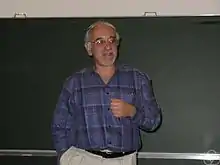Eduardo D. Sontag
Eduardo Daniel Sontag (born April 16, 1951 in Buenos Aires, Argentina) is an American mathematician, and Distinguished University Professor at Northeastern University, who works in the fields control theory, dynamical systems, systems molecular biology, cancer and immunology, theoretical computer science, neural networks, and computational biology.
Eduardo Daniel Sontag | |
|---|---|
 Sontag at a 2009 control theory workshop in Oberwolfach | |
| Born | April 16, 1951 |
| Nationality | U.S. |
| Alma mater | University of Florida University of Buenos Aires |
| Scientific career | |
| Fields | Control theory |
| Institutions | State University of New Jersey |
| Thesis | On the Internal Realization of Polynomial Response Maps (1976) |
| Doctoral advisor | Rudolf Kalman |
| Doctoral students | Hava Siegelmann |
Biography
Sontag received his Licenciado degree from the Mathematics Department[1] at the University of Buenos Aires in 1972, and his Ph.D. in Mathematics under Rudolf Kalman at the Center for Mathematical Systems Theory at the University of Florida in 1976.
From 1977 to 2017, he was with the Department of Mathematics[2] at Rutgers, The State University of New Jersey, where he was a Distinguished Professor of Mathematics as well as a Member of the Graduate Faculty of the Department of Computer Science[3] and the Graduate Faculty of the Department of Electrical and Computer Engineering,[4] and a Member of the Rutgers Cancer Institute of NJ. In addition, Dr. Sontag served as the head of the undergraduate Biomathematics Interdisciplinary Major, Director of the Center for Quantitative Biology,[5] and Director of Graduate Studies of the Institute for Quantitative Biomedicine. In January 2018, Dr. Sontag was appointed as a University Distinguished Professor in the Department of Electrical and Computer Engineering and the Department of BioEngineering at Northeastern University. Since 2006, he has been a Research Affiliate at the Laboratory for Information and Decision Systems, MIT, and since 2018 he has been a member of the Faculty in the Program in Therapeutic Science, Laboratory for Systems Pharmacology, at Harvard Medical School.
Eduardo Sontag has authored over five hundred research papers and monographs and book chapters in the above areas with over over 50,000 citations and an h-index of 100. He is in the Editorial Board of several journals, including: IET Proceedings Systems Biology,[6] Synthetic and Systems Biology[7] International Journal of Biological Sciences,[8] and Journal of Computer and Systems Sciences,[9] and is a former Board member of SIAM Review,[10] IEEE Transactions on Automatic Control, Systems and Control Letters, Dynamics and Control, Neurocomputing, Neural Networks, Neural Computing Surveys, Control-Theory and Advanced Technology, Nonlinear Analysis: Hybrid Systems, and Control, Optimization and the Calculus of Variations. In addition, he is a co-founder and co-Managing Editor of Mathematics of Control, Signals, and Systems.[11]
Sontag was married to Frances David-Sontag, who passed in 2017. His daughter Laura Kleiman [12] (PhD, MIT, 2010) is Founder and CEO at Reboot Rx,[13] a nonprofit focused on re-purposing generic drugs for cancer, and his son David Sontag [14] (PhD, MIT, 2010) leads the MIT Clinical Machine Learning Group [15] and is in the faculties of Electrical Engineering and Computer Science and the Institute for Medical Engineering and Science (IMES) at MIT.
Work
His work in control theory led to the introduction of the concept of input-to-state stability (ISS), a stability theory notion for nonlinear systems, and control-Lyapunov functions. Many of the subsequent results were proved in collaboration with his student Yuan Wang and with David Angeli. In systems biology, Sontag introduced together with David Angeli the concept of input/output monotone system. In theory of computation, he proved the first results on computational complexity in nonlinear controllability, and introduced together with his student Hava Siegelmann a new approach to analog computation and super-Turing computing.
Awards and honors
Sontag became an Institute of Electrical and Electronics Engineers (IEEE) Fellow in 1993. He was awarded the Reid Prize in Mathematics[16] in 2001, the 2002 Hendrik W. Bode Lecture Prize[17] from the IEEE, the 2002 Board of Trustees Award for Excellence in Research from Rutgers University, the 2005 Teacher/Scholar Award from Rutgers University, and the 2011 IEEE Control Systems Award.[18][19] In 2011 he became a fellow of the Society for Industrial and Applied Mathematics, in 2012 a fellow of the American Mathematical Society,[20] and in 2014 a fellow of the International Federation of Automatic Control.
Publications
He has authored three books and is an ISI Highly Cited researcher:[21]
- 1972, Topics in Artificial Intelligence (in Spanish, Buenos Aires: Prolam, 1972)
- 1979, Polynomial Response Maps (Berlin: Springer, 1979).
- 1998, Mathematical Control Theory: Deterministic Finite Dimensional Systems, 2nd Edition (Texts in Applied Mathematics, Volume 6, Second Edition, New York: Springer, 1998)
References
- Mathematics Department, University of Buenos Aires
- Department of Mathematics, Rutgers University
- Department of Computer Science Archived 2006-07-17 at the Wayback Machine
- Department of Electrical and Computer Engineering.
- "BioMaPS". Archived from the original on 2007-02-02. Retrieved 2006-06-18.
- IEE Proceedings Systems Biology
- Synthetic and Systems Biology,
- International Journal of Biological Sciences
- "Journal of Computer and Systems Sciences". Archived from the original on 2002-12-09. Retrieved 2006-06-18.
- SIAM Review Archived 2006-08-21 at the Wayback Machine,
- (MCSS Archived 2003-04-14 at the Wayback Machine
- https://www.linkedin.com/in/laurakleiman
- https://rebootrx.org/
- https://www.linkedin.com/in/david-sontag
- http://clinicalml.org/
- "Reid Prize in Mathematics". Archived from the original on 2005-02-23. Retrieved 2006-06-18.
- Hendrik W. Bode Lecture Prize
- "IEEE Control Systems Award Recipients" (PDF). IEEE. Retrieved March 30, 2011.
- "IEEE Control Systems Award". IEEE Control Systems Society. Archived from the original on December 29, 2010. Retrieved March 30, 2011.
- List of Fellows of the American Mathematical Society, retrieved 2013-07-26.
- Link to publication list Archived 2006-09-08 at the Wayback Machine).
